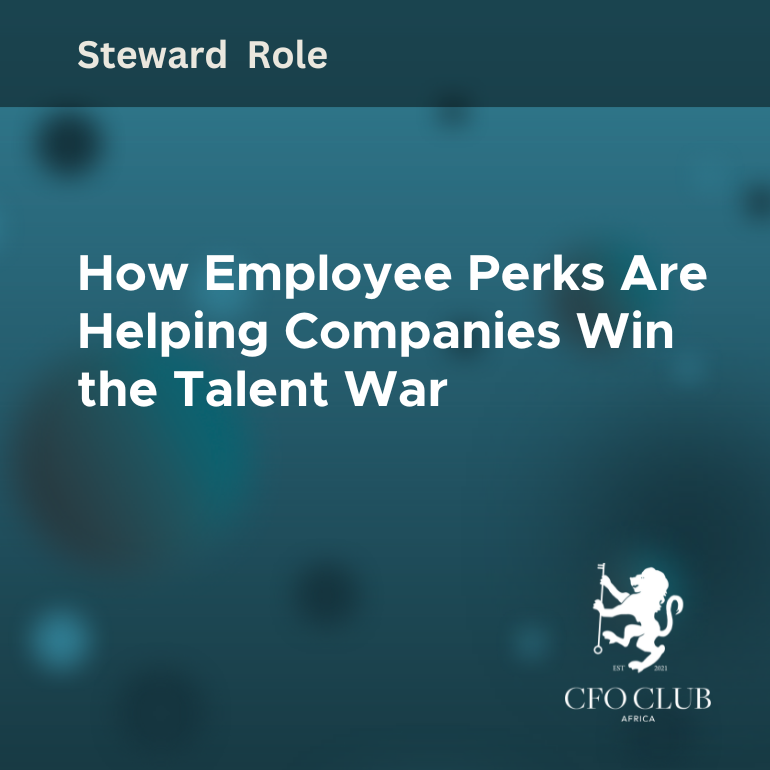How Employee Perks Are Helping Companies Win the Talent War
CFOs have always been responsible for safeguarding a company’s assets. Traditionally, that meant managing capital, systems and compliance. Today, one of the most valuable assets is also one of the most vulnerable: people.
The modern workforce is mobile, informed and increasingly selective. Skilled employees can leave for better opportunities without hesitation, and the cost of replacing them continues to climb. For South African businesses, this has turned retention into a form of risk management.
Employee perks, once dismissed as a “nice to have,” now form part of a company’s governance and sustainability framework. They are no longer about indulgence; they are about stewardship.
The Cost of Losing People
Turnover is not an HR inconvenience; it is a financial risk. When experienced employees leave, they take institutional knowledge, client trust and operational continuity with them. Studies consistently show that replacing a skilled employee can cost up to twice their annual salary once recruitment, training and lost productivity are included.
From a financial perspective, turnover affects far more than payroll. It disrupts workflows, weakens internal controls, and increases the strain on remaining staff. High turnover also raises compliance risks, as inexperienced employees may struggle to uphold the same level of accuracy and accountability.
Employee perks can act as a stabilising force. When benefits are designed to genuinely meet employee needs, they increase loyalty and reduce the volatility that constant rehiring brings. The CFO who recognises this sees retention as both a financial and ethical obligation.
Perks as Part of Corporate Governance
Good governance is about protecting value through structure, transparency and accountability. Employee perks, when properly managed, fit squarely into this framework.
CFOs who think like stewards understand that governance is not only about board reporting or financial disclosure. It also lives in the daily experience of employees. A team that feels supported, fairly rewarded and trusted is more likely to uphold the company’s values and act responsibly.
Perks that promote work-life balance, personal development and health support can reinforce ethical behaviour. A well-supported workforce makes fewer mistakes, reports concerns more confidently, and upholds standards more consistently. In this sense, a sound perks program can strengthen the culture of integrity that good governance depends on.
Financial Control Meets Human Value
The Steward CFO applies financial discipline to every investment, including those that target people. Perks should never become an uncontrolled expense category. They should be designed with the same rigour that applies to capital expenditure.
Each benefit must have a clear purpose, a measurable outcome and a defined budget. For example, if a company offers learning stipends, the CFO should track metrics such as employee retention, promotion rates and internal skill mobility. If wellness initiatives are introduced, absenteeism and productivity data should reflect improvement over time.
By bringing financial control to people-focused programs, the CFO ensures that each perk serves a real business objective. It transforms employee benefits from a cost centre into a managed investment.
Wellbeing as a Governance Priority
Employee wellbeing is no longer only a moral or cultural concern. It has become a compliance requirement and a key reporting dimension in environmental, social and governance (ESG) frameworks.
South African labour law, health and safety regulations, and emerging ESG disclosure standards require companies to demonstrate how they protect employees’ mental and physical health. For CFOs, this translates into structured budgeting, documentation and transparent reporting.
A strong wellness strategy protects the business from reputational and operational risks. It reduces absenteeism, strengthens morale and supports sustained productivity. It also aligns with investor expectations, as more stakeholders assess how organisations care for their people when evaluating long-term resilience.
For the CFO, wellbeing initiatives must be integrated into formal risk and compliance frameworks, with clear oversight and measurable return on investment.
Sustainable Perks Create Predictable Value
Short-term perks like free meals or office games can boost morale briefly but rarely build lasting value. Sustainable perks are those that align with both governance and long-term strategy. Examples include flexible work arrangements supported by formal policy, retirement contributions, health coverage, and structured learning opportunities.
These perks support employee security, build loyalty, and create predictable costs. They are easier to plan for and report on, which makes them financially sustainable. They also strengthen compliance with employment equity and B-BBEE obligations, helping companies remain competitive in both the market and regulatory environment.
Sustainability in this context means that perks continue to deliver value without undermining financial discipline. The Steward CFO ensures that benefits enhance stability, professionalism and fairness rather than creating entitlement or inconsistency.
Measuring the Return on Retention
Quantifying the return on employee perks requires careful analysis. The CFO should track trends such as turnover rates, engagement scores, absenteeism, and performance indicators. A drop in voluntary resignations or an improvement in employee satisfaction can directly translate into reduced operational risk and improved output.
By linking these data points to financial performance, the CFO can justify retention spending in the same way they justify investment in equipment or systems. It becomes a discussion about return on stability, not just return on cost.
This analytical approach gives the board and shareholders confidence that the company’s investment in people is responsible, measurable and aligned with its fiduciary duties.
The CFO as Custodian of People Value
In the current environment, the CFO is more than the guardian of financial data. They are the custodian of organisational health. The Steward mindset recognises that numbers are not the whole story. Behind every revenue line stands a workforce that either protects or erodes value.
By applying governance principles to employee wellbeing and retention, CFOs ensure that their organisations remain ethical, resilient and compliant. They balance human value with financial accountability and understand that culture, once lost, is expensive to rebuild.
The companies winning the talent war are not necessarily those that spend the most, but those that manage their people investments with wisdom, structure and care. For CFOs, that is the essence of stewardship — protecting value not only in rands, but in relationships.





